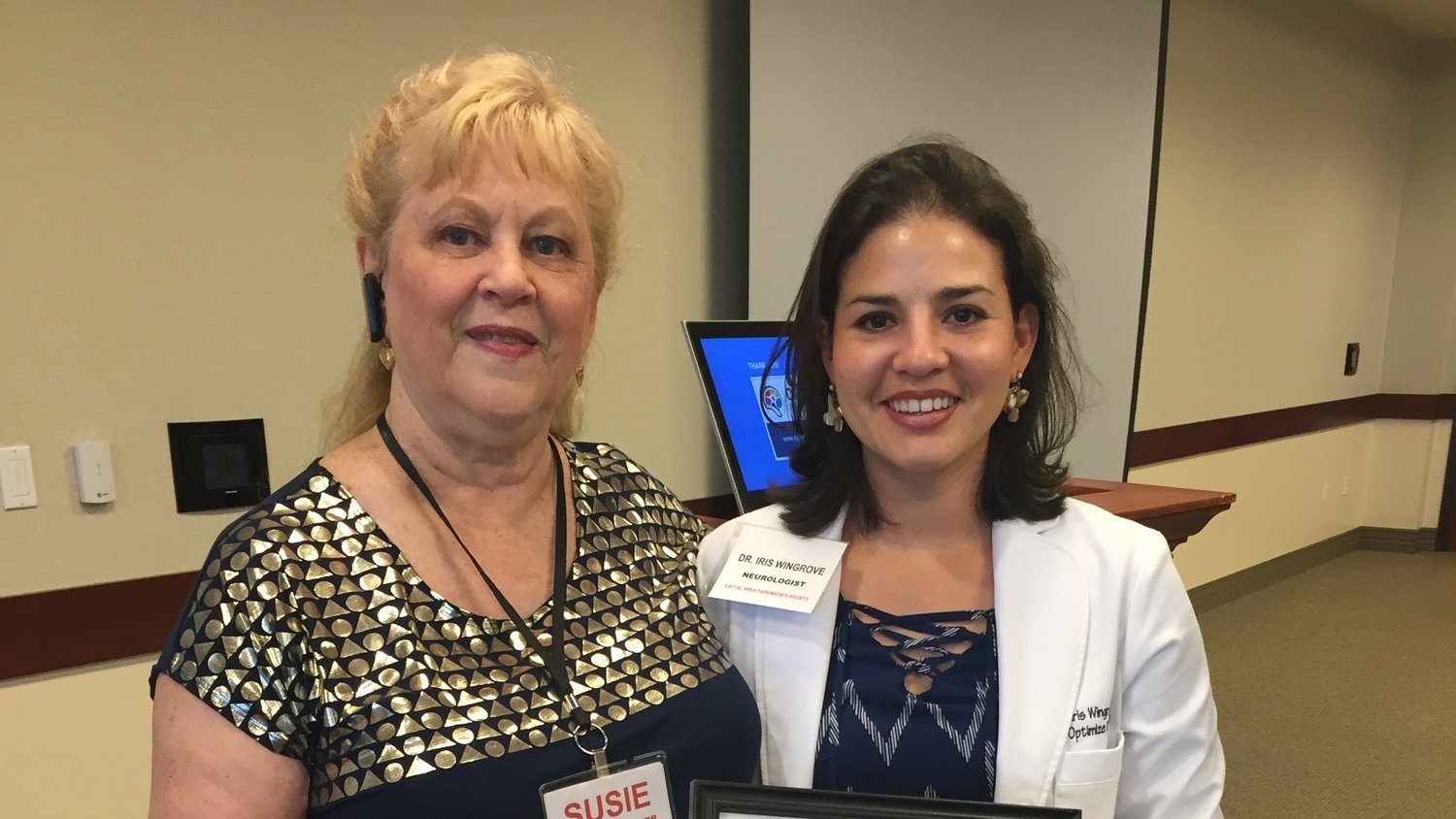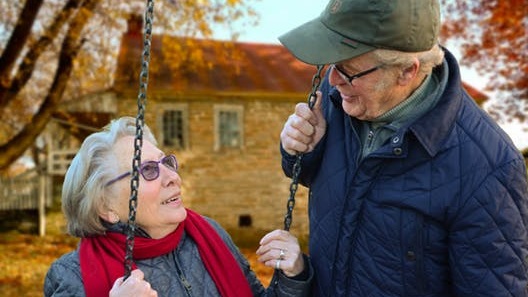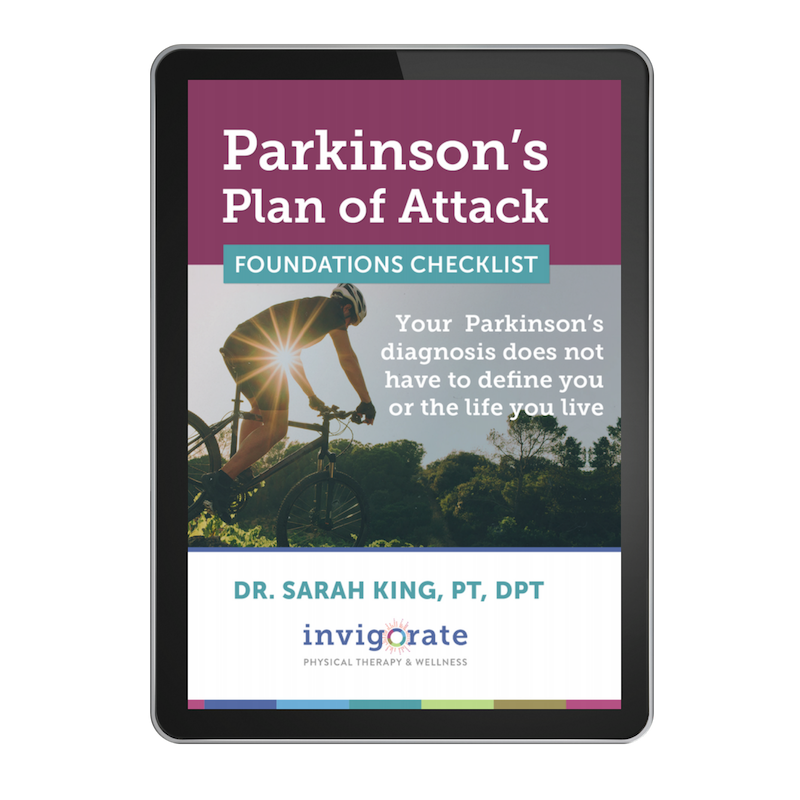Thanks to everyone who joined us in person to hear Colin's personal journey fighting Parkinson's!
(This is a transcription of a video recorded at the original event on April 14th, 2016. Due to numerous sirens, birds, cars, and screaming children - it was difficult to hear the video and this transcript was published instead.)
A Long Fight with Parkinson's
Colin Potter, founder of Fight-Parkinsons, was diagnosed with Parkinson's at age 61 after having symptoms for over 3 years. His symptoms progressed slowly over the following two years to the point he had significant pain in his back and arms from rigidity, tremors, a shuffling gait that left him fatigued and defeated after only a 15 minute walk, and could no longer participate in things he loved like hiking and golf. Most importantly, he couldn't keep up with grandkids like he imagined he would be able to just a few years before.
In October of 2013, Colin made a decision that would alter his future forever. He simply wondered: "Is this it? Is Parkinson's going to be the end of me?"
From that day, Colin embarked upon a yearlong journey of research into what might be behind Parkinson’s and how he might overcome his symptoms.
Coming Out the Victor
Today, through significant changes in his nutrition and exercise regime, Colin has been able to reverse a majority of his Parkinson's symptoms. He's returned to golfing, hiking, and playing on the floor with his now 2 grandchildren, Holly and Ethan. While he doesn't feel he's cured, he notes that Parkinson's is no longer in the driver seat of his life.
Colin came "across the pond"
While Colin currently resides in England, he recently made a visit to Austin to visit Invigorate PT and Wellness, Dr. Wingrove at Optimize Neurology, and Dr. Julie Reardon of Integrative Family Medicine to learn even more about the various treatment options for people with Parkinson's Disease.
While he was here, he agreed to a "walk and talk" with the Parkinson's community to share his story and offer encouragement, motivation, and inspiration through his story.
“Walk and Talk with Colin Potter of Fight-Parkinsons.org”
April 14th, 2016 - 11am at Mueller Lake Park, Austin, Texas
Sarah: Thank you all for coming today. Colin’s here from ‘across the pond’. I met Colin originally through a mutual friend with PD and connected with him because he embodies the whole message that I work with my PD clients on which is understanding there’s a hope for a future of living with Parkinson’s that goes beyond the traditional approach of just taking your medication and waiting for a cure. Colin’s going to take today as an opportunity to talk about his journey and approach. It’s all you Colin - take it away!
Colin: Hello everyone. I want to start off with an example. If you have water coming through your ceiling, what do you do? Do you put a bucket down… and another bucket down… and another bucket down.. And keep increasing the size of your bucket? Or, do you do what any reasonable person would do and say “Where’s the water coming from? What’s the cause (of the leak)?” Most of us would do the second - find the cause and then apply the solution. So when I got my Parkinson’s Diagnosis this is what I started to do.
When I first saw the neurologist, they asked me to do a few things like this (tapping fingers together) and then said “You have Parkinson’s. It’s a degenerative neurological disease. What drugs do you want?”. And that was it.
I asked him, “What’s the cause of Parkinson’s?” He responded, “You lose dopaminergic neurons of the brain.” Well, that wasn’t much of an answer to me but I left it there because I didn’t know much better at the time.
So, let me back up and tell you a little about the symptoms I was having. It’s a bit hard to remember now because those things get forgotten. I had a tremor; I had lost functionality of my right hand and fine motor movement; I couldn’t write - my handwriting was appalling; and I was dragging my foot as I walked. I had rigidity in my back that was debilitating. The biggest worry to me was when i started to go across the road, I got nervous and had a real hesitation and frightened I wouldn’t make it in time.
After that diagnosis it took me 2 years of just living with it and not doing much about it. At that time, I was convinced to go onto leva-dopa medication. My Parkinson’s nurse said it was a ‘natural’ compound in synthetic form so I started taking it. By this time, my son was getting married in California and I had taken to his wedding. I was asked to give a talk and was jerking like a marionette. I had the microphone in one hand, my notes in the other, and was shaking so bad I couldn’t hold onto the cards. At that point, I thought “Something has got to change.” That was really the start of my journey.
At that point, someone passed me a book called Grain Brain by Dr. David Perlmutter and that was totally revelating. That was the first time I had heard anyone speak to the connection between lifestyle and neurodegenerative conditions. It also cited a large amount of research and there is a resource called PubMed which is an online database of research studies run by the U.S. National Institute of Health (NIH) and contains 25 million studies and there’s lots on Parkinson’s. They’re all performed by accredited universities and clinical research facilities and is largely ignored by traditional medicine. But this is the key, I found, to what was going on with me.
I went to PubMed and entered “diet and Parkinson’s” and up popped a whole load of studies. One really caught my eye about the ketogenic diet and Parkinson's. It cited a research study performed at Columbia University in New York that studied a dozen patients with Parkinson’s ate a ketogenic diet - a diet high in fat and low in carbohydrates - and in 28 days they showed a large improvement in their PD symptoms on the UPDRS scale. I thought, “Wow! That’s really incredible. I’m going to go on that diet.” And from that moment all sugars, glutens, carbohydrates were out. I was on a kind of ketogenic diet - not an extreme diet. That was the start of the research that opened my eyes. I started to realize what the right type of diet could do.
I started other research, which is easy to do using PubMed, and started studying up on anything I could find on Parkinson’s. I soon came across the topic of nutritional deficiencies. I began to learn about the importance of vitamins and Parkinson’s. Also, glutathione - has anyone heard of glutathione? It’s your body’s master antioxidant. It helps you clear up your oxidative stress and I found that typically people with Parkinson’s are deficient in glutathione. Eventually I started to supplement with the vitamins I read about to reduce my inflammation.
After about 6 months, I had my first sign that things were working. The rigidity in my back had cleared and this allowed me to be mobile. Once I was mobile, things started to improve and it was encouragement to continue with the diet. After 9 months I was walking better. After 12 months I was able to go completely off of medication. So, since November 2014 I’ve been off all Parkinson’s medications. It’s just gotten better and better.
Since then, that was the start of the journey. I thought that people with Parkinson’s should be able to access this information so I wrote a short book which we published online (www.fight-parkinsons.org). That was a kind of an end-point but really a starting point. That gave me a lot of contact with a lot of people with Parkinson’s with a whole lot of questions. Mainly, they want to know if it will work for them. The truth is the answer is: We don’t know. They want to know, “Can this diet work for me?”. Now I feel as if it’s my job to help people access information so they can make their own informed decisions.
Since that time I’ve continued my research and have learned more about toxins and the impact on Parkinson’s. There are toxins in everything including processed foods, toothpastes, deodorants, and so many others. There are about 2,000 chemicals used in foods alone! They don’t know what impact those have on Parkinson’s symptoms. I decided to switch my shower gel and personal care products to only organic to decrease my exposure.
I also started adding exercise. At the beginning, when the back pain and rigidity was so debilitating, I couldn’t move. Once I started feeling better, however, I started going to a gym. Now I work with a personal trainer 3 times a week. I went there with the intention to hide the tremor, and to help with the heaviness of my right arm. Now I’ve been working on the strength of my core and my legs and I’ve noticed that I’m more mobile, the heaviness in my arm is improved, my tremor is mostly silent - except for when I’m stressed, like right now giving this talk. So I’ve started to learn the power of exercise and Parkinson’s.
So that’s where I’ve made it - changed my diet, reduced my toxin intake, added exercise - all natural things that anybody can do to improve their situation.
And of course, coming to Austin to meet Sarah. I’m excited to be here to meet Sarah because what she’s doing is especially innovative. I was also introduced to Dr. Iris Wingrove who is a holistic neurologist which is vital to understanding what is going on at a deeper level. So that’s why I’m in Austin.
So, where do we go now? I’ve got a website (www.fight-parkinsons.org) and a Facebook page with 12,000 followers of people who are looking for answers. But you know, I’ll get an e-mail saying have you heard of this therapy or that therapy - and there are a lot of therapies out there. Ones that may work for one person but not another. Our goal (at Fight-Parkinson’s) is to bring people together and provide information so that people can make the best decisions possible for them.
(Colin gives examples of various therapies: magnetic sole shoe inserts helped a fellow PWP with balance issues; forced pedaling bicycle helped a friend with PD reduce his freezing).
Sharing this type of information is what we’re trying to do and where I am today. I trust in diet and taking personal care of yourself can be a large part in the management of Parkinson’s disease.
So that’s enough from me. Are there any questions?
George: Do you know of any food that replaces dopamine?
Colin: Well, I’ve read of a man in California who recommends making smoothies and juice out of foods in the aubergine family that used those foods to help him decrease his symptoms and avoid DBS. I don’t know of anyone else who replicated it but he was able to restore his functionality. The low-carbohydrate, high-fat diet I followed knocks out sugars, carbohydrates, gluten. No bread, no potatoes, no pastries, no cookies, no cakes, nothing like that. I eat plenty of vegetables, cheese, nuts, fish, … and I don’t feel as if I’m missing anything.
Lauren: What was the name of the antioxidant you mentioned?
Colin: Glutathione - your body’s master antioxidant. That’s something that’s deficient in many, many, many people causing oxidative stress.
Sarah: Something I think is interesting about your story is what you found about inflammation in the brain and where you went with that to shape the diet you’re on now. What did you find out about inflammation as a whole and why did you end up on the diet you did?
Colin: Inflammation is interesting - I hadn’t heard this before. Our diets are supposed to be balanced in Omega-3s and Omega-6s in a 1:1 ratio. The direction our foods are going with processing, especially hydrogenated oils like vegetable, soybean, canola oil - is making our diet heavy in Omega-6s. Now, as our diet has changed over the last 60 years, the ratio of Omega-3s to Omega-6s is closer to 1:20. This causes the inflammation levels in our body to rise and you can see it evidenced by the growing number of chronic, inflammatory diseases occurring in our population like diabetes, Alzheimer’s, Parkinson’s, heart disease. It all comes down to an inflammatory response. So the diet that I’m on now minimizes that inflammation. It helps reduce Omega-6s and raises Omega-3s so my ratio is closer to 1:1. That MAY be one of the reasons I’ve had such success. There are so many ‘MAYs’ it’s hard to tell what’s really worked. What I’ve done is throw everything in at once because I didn’t have time to do each one individually.
Lauren: What was the name of the diet you mentioned?
Colin: Ketogenic diet. The study again was from Columbia University in New York.
Jim: Do you take a lot of supplements?
Colin: Yes, I do take a lot of supplements. That’s one of the reason’s I wanted to come here and meet with Dr. Wingrove. I’ve taken a kind of extreme approach. As I came across research that supported a certain supplement - Vitamin A, Vitamin D, and the like - I added it. I began taking high doses but now I’d like to start taking a more targeted approach based on what my specific needs are instead of taking a lot of all of them.
Sarah: Have you ever gone off your diet? Do you notice a difference if you do?
Colin: Traveling presents an issue. I’m best at home since I have a regular regime. Occasionally I’ll have something that I shouldn’t really have, let’s say something that contains sugar. I will notice the next day that something’s changed. I am just very in tune with my body now. Honestly I rarely go off because the price of going off the diet just isn’t worth it. Clearly Parkinson’s is enough of an enemy and I just try not to give it a chance.
Sarah: When you changed your diet, what challenges did you have to change your diet to a whole new lifestyle?
Colin: When I saw that chink of light I wanted to go straight towards it. I believed I would wriggle out of Parkinson’s, I don’t know why, so when I saw that chink of light I went for it. So, it wasn’t a challenge. You miss a few foods to start with but then you figure those foods aren’t helping you in any way so why bother? Once you’re given that chink of light and an opportunity to do something about your Parkinson’s, you do it.
Bettye: Did you lose weight when you went on this diet?
Colin: Yes. I lost about 20 pounds which I needed to lose. Since starting to exercise I’ve built up muscle and put on about 10 pounds since then.
Lauren: Do you do brain exercises like puzzles or games?
Colin: I chaired a charity for children with cerebral palsy who taught something called ‘conductive education’ which was a type of neurological training but it wasn’t the same as what you’re asking about. I get my mental stimulation from the research and study that I do which is a lot of mental application. I do a lot of reading and research because if you don’t use it you lose it.
_________________________
For more information about Colin Potter, please visit:
Facebook: https://www.facebook.com/Fight-Parkinsons-880798098620903





